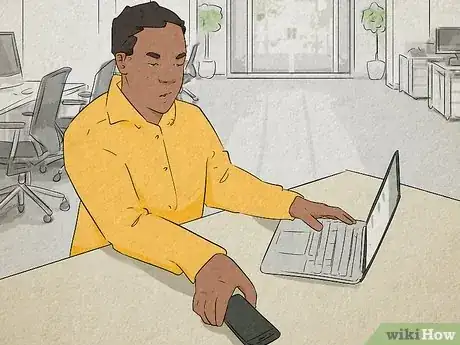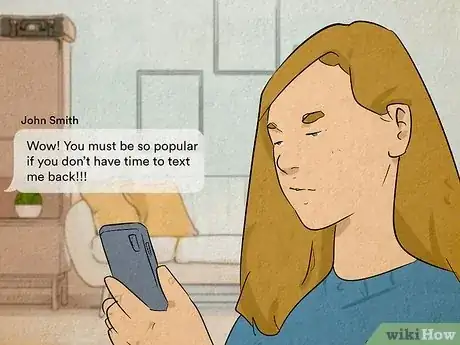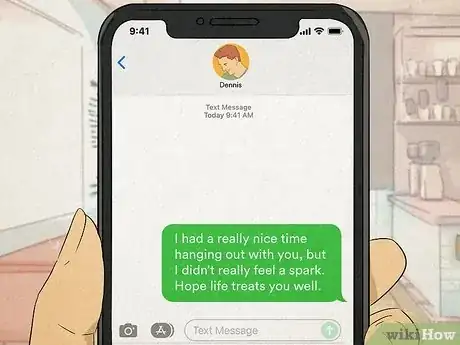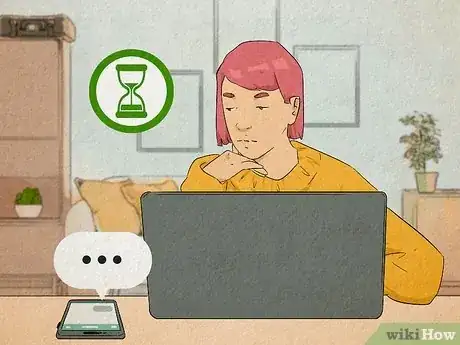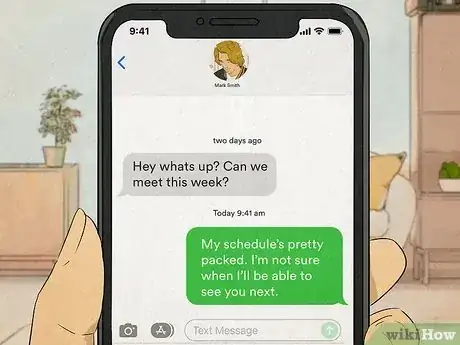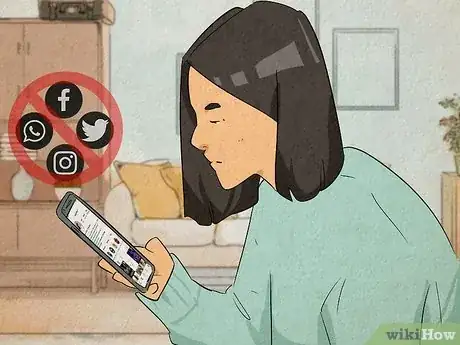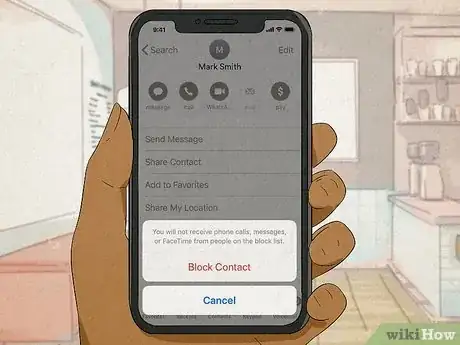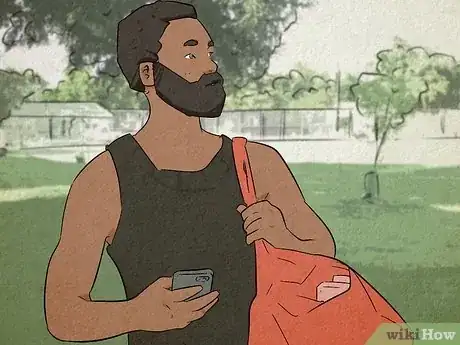This article was co-authored by Sarah Schewitz, PsyD and by wikiHow staff writer, Hannah Madden. Sarah Schewitz, Psy.D. is a licensed clinical psychologist by the California Board of Psychology with over 10 years of experience. She received her Psy.D. from the Florida Institute of Technology in 2011. She is the founder of Couples Learn, an online psychology practice helping couples and individuals improve and change their patterns in love and relationships.
This article has been viewed 81,414 times.
Why ghost someone? If you’re a conflict-avoidant person or you’ve been seeing someone casually, ghosting might sound like a great option when you just aren’t feeling it anymore. While ghosting itself is pretty simple, there are a few different ways you can break things off with someone depending on the outcome you want. In this article, we’ll tell you exactly how to ghost a friend or a potential date without feeling bad about it.
Steps
Cut off all contact.
-
In order to ghost someone, don’t reach out to them at all. That’s the definition of ghosting. If they text, call, or message you, don’t respond. Eventually, they’ll get the hint that you don’t want to talk anymore, and they’ll stop reaching out.[1] X Research source
- Ghosting works best if you haven’t made concrete plans with this person. If you do have plans together, let them know that you have to cancel before you ghost so they can free up their schedule and make new plans.
- Cutting off contact is a good option if you're in an on again/off again relationship with someone.
Expect some backlash for your ghosting.
-
The person you’re ghosting might get upset when they don’t hear from you. While it’s easy to just stop responding to someone’s texts or calls, they might be a little hurt or confused as to why you stopped reaching out. If you choose to ghost someone, expect that they might call or text you asking for an answer, especially if you’ve known them for a long time.[2] X Research source
- If you’re ghosting a long-term partner or friend, they’re probably going to make a lot of attempts to contact you. However, if you’re ghosting someone you’ve only known for a little bit, they might not be super hurt by your decision to ghost them.
- The backlash for ghosting really depends on the type of relationship you had with the other person. If you ghost someone after a single date, you probably won't get much backlash. However, if you ghost someone after a month of dating, it's a whole different story.
Send one last message to ghost nicely.
-
Sending a final message is called caspering, or the friendly way to ghost. With this version of ghosting over text, you send the person one last message thanking them for their time and breaking things off. This is a nice way to end things, because it doesn’t involve a long conversation, but you’re still giving the other person the closure they need to move on.[3] X Research source
- “It was really nice to meet you, but I don’t think this is going to work out. I wish you all the best.”
- “I had a really nice time hanging out with you, but I didn’t really feel a spark. Hope life treats you well.”
Wait a long time before replying to ghost slowly.
-
Soft ghosting sends the hint that you don’t want to talk anymore. If you don’t want to send a final message, you can distance yourself from the person by taking a long time to respond to their texts. If you usually text them back within a few minutes, try waiting a few hours (or even days). If they pick up on it, they might get the hint that you just aren’t into them.
- This method works best if you don’t have any time-sensitive plans coming up. However, if you’re still trying to figure out when and where to meet up next, this is a good option.
- Ghosting timelines vary since every relationship is different. However, waiting around 3 days before responding is usually a good indicator that you’re trying to ghost someone.
Make up excuses to ghost over a long period of time.
-
Saying you can’t hang out over and over might be enough of a hint. If you want to let this person down gently, start coming up with excuses as to why you can’t meet up with them. If you give them enough reasons, eventually, they’ll probably stop reaching out to you.
- “Sorry, work’s been crazy lately. I don’t think I can hang anytime soon.”
- “My schedule’s pretty packed. I’m not sure when I’ll be able to see you next.”
Unfollow them on social media.
-
Remove any outlets for communication so they can’t contact you. If you follow this person on Instagram, Twitter, or Facebook, go ahead and unfollow them. After you’ve unfollowed, they’re even more likely to get the hint that you just don’t want to talk to them anymore.[4] X Research source
- If they keep messaging you online, you can always block their social media accounts, too.
Block their number if you need to.
-
Some people are persistent, and they won’t take your ghosting lightly. If the person you’re trying to distance yourself from insists on reaching out constantly, you may have to block their number. That way, you won’t see their messages anymore, and you don’t have to worry about them contacting you continuously.
Never contact that person again.
-
Stick to your ghosting decision so you don’t confuse the other person. Ghosting is a pretty serious decision, and it’s not one that you can take back anytime soon. Reaching out to the person you’ve ghosted is called “zombie texting,” and it can be confusing (and frustrating) for the person you’re trying to reconnect with.[5] X Research source
- If you ghosted someone and feel bad about it, you can send them an apology message if you’d like to. However, it doesn’t mean they’ll forgive you, and you may still never hear from them.
You Might Also Like

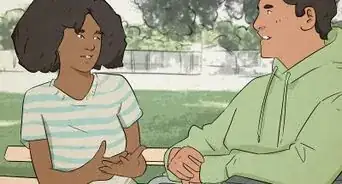 Signs Your Ex Will Eventually Come Back
Signs Your Ex Will Eventually Come Back


 What Are the Bases in a Relationship? Defining the Baseball-Sex Metaphor
What Are the Bases in a Relationship? Defining the Baseball-Sex Metaphor
 The Top Emojis a Girl Will Use if She Likes You
The Top Emojis a Girl Will Use if She Likes You
 How to Tell if Your Girlfriend Is Horny: 12 Signs She's Turned On
How to Tell if Your Girlfriend Is Horny: 12 Signs She's Turned On
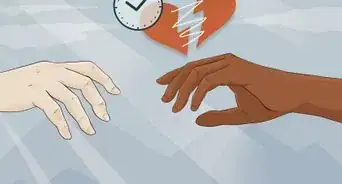 What to Do When Your Girlfriend Is Mad at You (10+ Steps to Take)
What to Do When Your Girlfriend Is Mad at You (10+ Steps to Take)
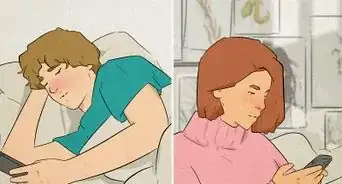 12+ Texts to Send Your Girlfriend After a Fight: Apologies & More
12+ Texts to Send Your Girlfriend After a Fight: Apologies & More
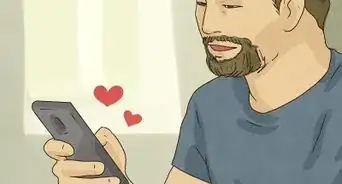 How to Have Phone Sex with Your Girlfriend
How to Have Phone Sex with Your Girlfriend
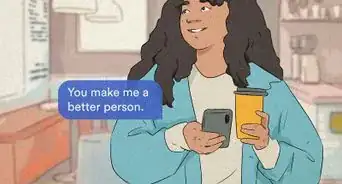
 33 Sweet & Romantic Apology Messages for Your Love
33 Sweet & Romantic Apology Messages for Your Love
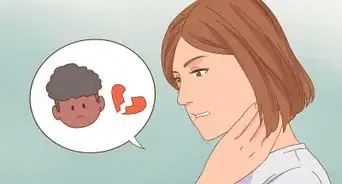
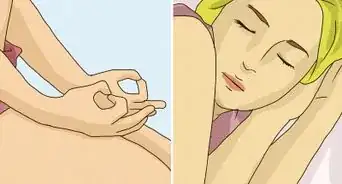 12 Ways to Break a Narcissist's Heart
12 Ways to Break a Narcissist's Heart
References
- ↑ https://www.gq.com/story/ghosting-guide
- ↑ https://www.gq.com/story/ghosting-guide
- ↑ https://www.psychologytoday.com/us/blog/dating-in-the-digital-age/202104/is-there-such-thing-friendly-ghosting
- ↑ https://www.psychologytoday.com/us/blog/dating-in-the-digital-age/202104/is-there-such-thing-friendly-ghosting
- ↑ https://www.nytimes.com/2019/01/22/smarter-living/why-people-ghost-and-how-to-get-over-it.html
About This Article

